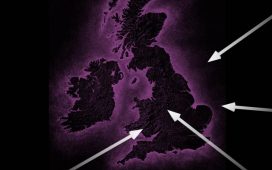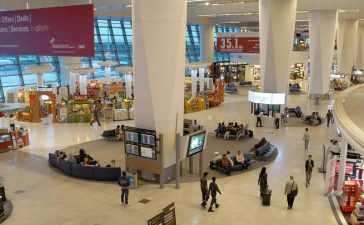
To understand the pervasive and deeply damaging impact of the war in Ukraine it is only necessary to glance at headlines here in Britain, far away from the shelling. Tomato rationing at your local Tesco, for example. The reasons for shortage are many and complex but one that’s agreed on is that supplies from growers in Britain and the Netherlands are lower than usual because farmers can’t afford to run energy-intensive greenhouses; in turn, that’s because of sanctions on Russian oil exports imposed by the West and a deliberate policy by the Kremlin of restricting energy supplies to Europe.
Much the same goes for the loss of 300 jobs at the British steelworks in Scunthorpe, with possibly many thousands to follow. Steel takes a lot of energy to make, and the Chinese firm that owns the company says parts of the plant are no longer economical because of the high cost of energy. Or take the food bank in Flintshire that has reported a doubling of demand over the past year caused by the cost of living crisis and high inflation. The war in Ukraine is again to blame – at least in part. Energy is an input into everything we consume or use, from a takeaway Domino’s pizza baked in a hot oven and delivered via a petrol-powered moped to a new-build home made of energy-intensive brick. If you wanted to find a way of wrecking the global economy by squeezing every home and business on the planet, a war that reduces energy and food supplies would be the tool of choice.
As governments across the world have tried to ease the pain by subsidising vulnerable households and businesses, they have piled yet more debt on top of the mountain still left from the 2008 global financial crisis and the Covid pandemic, worsening a painful hangover that will last for decades. Public services such as health and education will be harder-pressed as the need for re-armament grows; a Leopard 2 tank is about $5m a pop, and an F-16 fighter jet will set taxpayers back at least $12m.
Before the war, Ukraine and Russia were major producers and exporters of gas, oil, grains and sunflower oil used in cooking. Since it began, the disruption to Ukraine’s farming and the Russian blockade of its Black Sea ports has crippled supplies. As globally-traded commodities, the effect has been to send world prices much higher and the effects have been felt everywhere. In the West, it has pushed inflation higher – into double figures, in many nations – squeezing the purchasing power of wages and prompting central banks to push interest rates higher to choke off demand and get price rises under control. Those effects have pushed Britain close to recession and provoked a wave of strikes, particularly in the public sector. Trace the overwhelmed hospitals through the public finances, then back through lower growth and depressed tax revenues, and you eventually end up in Donetsk or Luhansk. Wholesale energy prices have recently been falling rapidly, reflecting not the end of the conflict but rather the slowdown in the world economy and, more ominously, some successful sanctions-busting by the Russians.
In its last economic outlook, the OECD summarised the effects on the world economy: “Persistent inflation, high energy prices, weak real household income growth, falling confidence and tighter financial conditions are all expected to curtail growth. Higher interest rates, while necessary to moderate inflation, will increase financial challenges for both households and corporate borrowers.”
War is unpredictable and heightens risks for investors. In turn, that will depress future productivity growth and living standards. Mutual tension between the five global economic giants – the US, China, the EU, India and Japan – can only depress flows of trade and investment that keep the world economy moving forwards. Such tensions have been growing for years, and with them the damaging process of “de-globalisation”, but Russia’s 2014 annexation of Crimea and the 24 February last year invasion, has pushed Russia closer to China, and to some extent India, while greatly accelerating the trend to protectionism.
Most distressing has been the effect on the world’s poorest. Much of the Middle East and North Africa depends on grain and cooking oils from Ukraine and, before the UN-brokered urgent exports through the Russian blockade, those countries faced near-starvation and subsequent civil unrest. As its crudest, Russia used the poor and hungry of Egypt and Yemen to try and gain diplomatic leverage in its internationally-condemned invasion. Putin also used gas and electricity costs to demoralise Western consumers and degrade the industrial strength of Germany – with some success.
Given the dramatic effect on Western economies, it’s strange to reflect that sanctions on Russia were meant to hurt the Russians more than us. The opposite has been true. The West hoped that targeted sanctions on oligarchs, bans on Western exports, and disinvestment by major Western companies would trigger something of a new Russian revolution. Deprived of their McDonalds meals, Shell petrol, and jobs in Renault car factories. Muscovites had been expected to put pressure on the Kremlin.
Instead, Putin’s propaganda machine has turned Russia’s pariah status into proof of Western malevolence, evidence that Russia is under existential threat from America and its client states. Former Western businesses have in many cases been taken over by the Russian state, or else bought at a knock-down price. Once acquired, these works can be repurposed to war production. After years of Communism followed by the wild west capitalism of the Yeltsin era, Russians are more inured to economic disruption than their Western counterparts. The West underestimated their resilience, as well as the extent of their acceptance of Putin’s anti-American mythology.
As on the battlefields of the Donbas, the global economy feels as if it is settling into a struggle of attrition. In the West, inflation remains high – though falling – and growth in output and living standards will be sluggish for many years. Russians are finding ways to break sanctions, no doubt tutored by their friends in Tehran and Pyongyang long used to this game, and Moscow’s trade with China, Turkey and India has been booming. As with the old Soviet Union, Russians will eventually tire of shortages and restrictions, but it’s going to be a long slog for all involved.











